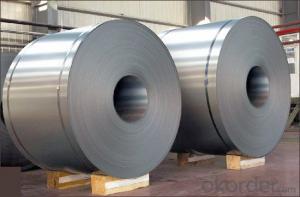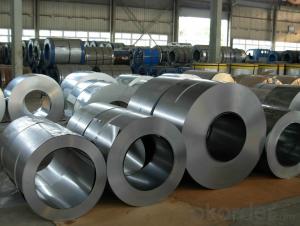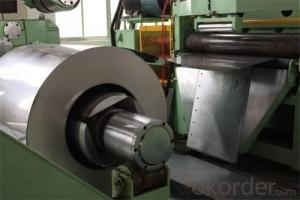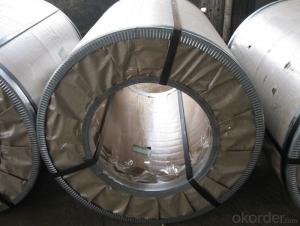Best Cold Rolled Steel Coil ASTM 1008 High Strength
- Loading Port:
- China main port
- Payment Terms:
- TT OR LC
- Min Order Qty:
- 50 m.t.
- Supply Capability:
- 10000 m.t./month
OKorder Service Pledge
OKorder Financial Service
You Might Also Like
Best Cold Rolled Steel Coil ASTM 1008 High Strength
1.Structure of Best Cold Rolled Steel Coil ASTM 1008 High Strength:
The raw material of cold rolled steel coil/sheet is high quality hot rolled product, and after pickling continuous rolling, degreasing, annealing,skin pass,slitting and cut to length line etc. Along with it many kinds of new technology and new process of global cold rolling production have been applied. Therefore the quality of the goods could be guaranteed.
2.Main Features Best Cold Rolled Steel Coil ASTM 1008 High Strength:
• Excellent process capability
• Smooth and flat surface
• Workability, durability
• Good visual effect
3. Cold Rolled Steel Images:
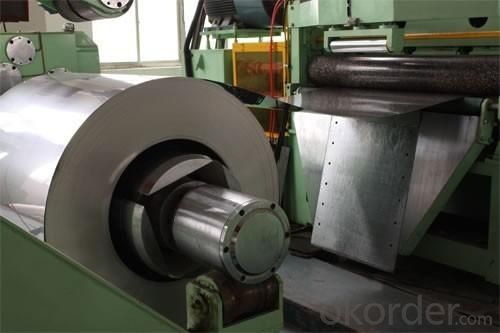
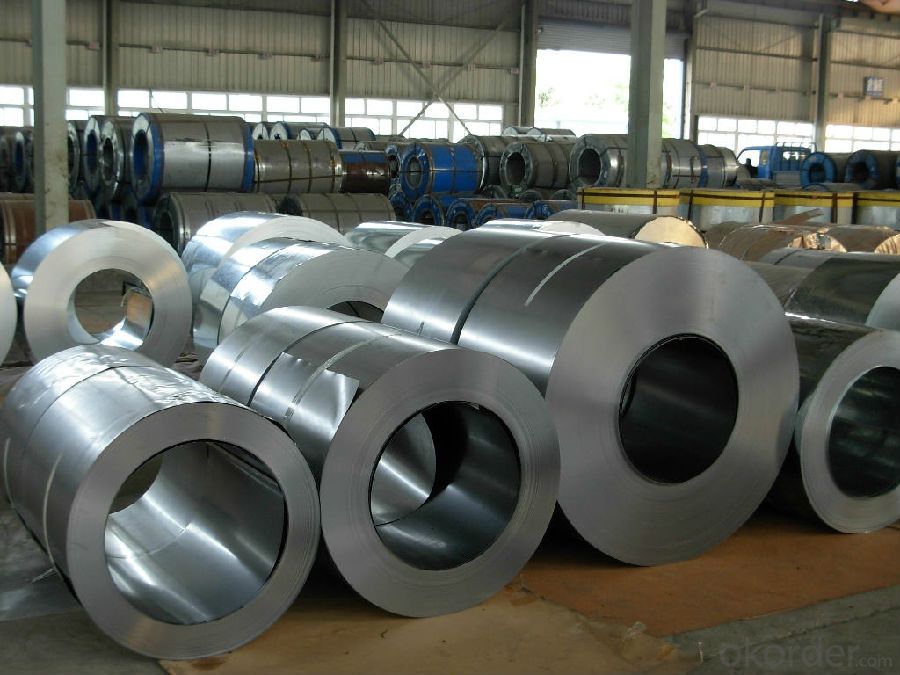
4.Cold Rolled Steel Specification
Standard:AISI,ASTM,DIN,GB,JIS,JIS G3302 ASTM 653M EN10142
Grade: Q195~Q345
Thickness: 0.16mm~2.0mm
Width: 1250mm MAX
Coil weight:3-12 MT
FAQ
1.How to guarantee the quality of the products?
We have established the international advanced quality management system,every link from raw material to final product we have strict quality test.
2. How long can we receive the product after purchase?
Usually within thirty working days after receiving buyer’s advance payment or LC. We will arrange the factory manufacturing as soon as possible. The cargo readiness usually takes 15-25 days, but the shipment will depend on the vessel situation.
- Q:Explain why a steel nail sinks but a steel ship floats.
- Its all about dispersing.weigh and mass. Over a larger area .And the surface tention of the water.A piece of glass will float as long as the water is calm. and doesn't break over the edge of the glass. I don't remember the formula. been away from school to long.
- Q:I need to know what steel's weakness is.
- look okorder
- Q:How is the demand for steel coils influenced by the construction sector?
- The demand for steel coils is heavily influenced by the construction sector. As construction activities increase, so does the demand for steel coils as they are essential for various construction applications such as structural components, roofing, and reinforcing materials. Conversely, when construction activities decline, the demand for steel coils also decreases. Therefore, the construction sector plays a crucial role in driving the demand for steel coils.
- Q:What are the different types of steel coil grades?
- There are several different types of steel coil grades, including hot rolled coil (HRC), cold rolled coil (CRC), galvanized coil (GI), galvannealed coil (GA), and stainless steel coil.
- Q:How are steel coils used in the production of heating systems?
- The production of heating systems relies on the utilization of steel coils in various ways. One primary application of steel coils in heating systems involves their incorporation in the construction of heat exchangers. Heat exchangers serve a vital purpose in the transfer of heat from one medium to another within the heating system. Typically, the steel coils are shaped into tubes or fins, which maximize the surface area for optimal heat transfer. In a typical heating system setup, the steel coils allow hot gases or liquids to pass through them, while another medium, such as air or water, flows over or through the coils. This arrangement facilitates the efficient transfer of heat energy from the hotter medium to the cooler one, effectively heating the air or water for distribution throughout the heating system. Steel coils are also employed in the production of radiant heating panels or floor heating systems in heating applications. In these instances, the steel coils are usually embedded within a panel or positioned beneath the flooring. When electricity or hot water passes through the coils, they heat up and emit heat to the surrounding environment. This particular heating system type boasts high efficiency and ensures a comfortable and evenly distributed heat output. Moreover, steel coils are integral components of heating systems such as boilers, furnaces, and heat pumps. These heating system units often require the use of steel coils due to their excellent heat transfer capabilities and durability. The integration of steel coils into the design of these units guarantees efficient and reliable heat generation and distribution. In summary, steel coils play a critical role in the production of heating systems as they enable efficient heat transfer, provide durability, and facilitate the generation and distribution of heat.
- Q:How do steel coils compare to aluminum coils?
- Steel coils are generally stronger and more durable than aluminum coils. They have a higher tensile strength and better resistance to impact and abrasion. However, aluminum coils are lighter, more corrosion-resistant, and have better thermal conductivity. The choice between steel and aluminum coils depends on the specific application and the desired characteristics such as strength, weight, and corrosion resistance.
- Q:How are steel coils weighed?
- Steel coils are typically weighed using industrial weighing scales or load cells. These devices are capable of accurately measuring the weight of the coils, whether they are small or large in size. The coils are placed on the scale or load cells, and the weight is digitally displayed or recorded for further analysis or documentation.
- Q:What are the common coil weights available for steel coils?
- The common coil weights available for steel coils vary depending on the specific application and industry requirements. However, there are a few standard coil weights that are commonly available in the market. These include: 1. Light coils: Light coils typically have a weight range of 3 to 6 metric tons (6,000 to 13,000 pounds). These coils are commonly used in industries such as automotive, construction, and appliance manufacturing, where smaller, more manageable coil sizes are preferred. 2. Medium coils: Medium coils generally range in weight from 6 to 15 metric tons (13,000 to 33,000 pounds). These coils are utilized in a wide range of industries, including construction, infrastructure, and general manufacturing. 3. Heavy coils: Heavy coils are typically heavier than 15 metric tons (33,000 pounds) and can go up to 30 metric tons (66,000 pounds) or more. These coils are commonly used in industries like shipbuilding, heavy machinery manufacturing, and infrastructure projects that require large and sturdy steel components. It's important to note that these weight ranges are not fixed and can vary depending on the specific requirements of the customer or industry. Additionally, some manufacturers may offer custom coil weights to suit unique project needs. It is always recommended to consult with a steel supplier or manufacturer to determine the most suitable coil weight for a specific application.
- Q:How are steel coils used in the manufacturing of conveyor belts?
- Steel coils are used in the manufacturing of conveyor belts as they provide strength, durability, and flexibility to the belt structure. These coils are typically used as reinforcements or as the core material to enhance the belt's load-bearing capacity and resistance to tension and impact. By incorporating steel coils, conveyor belts can effectively transport heavy materials over long distances while maintaining stability and longevity.
- Q:I've heard on some 1911 forums that the slides of Armscor guns are now extruded. What is extruded steel? How is it made? Are they strong (4140carbon steel was used in the process).
- Extruded steel is only the steel being run through a die when it is heated, it usually reduces the size of the grain of the steel itself, enhancing toughness. Realistically though, in a handgun, it doesn't matter if the frame is cast or forged, both types will hold up to any amount of abuse, unless you use it as a sledgehammer, and are splitting stones with it, then the forged frame would win. 4140 is more than adequate for a slide/frame. Hell, even mild steel would be adequate as long as you don't mind some dings and scratches, and again, don't use it as a sledgehammer...
1. Manufacturer Overview |
|
|---|---|
| Location | |
| Year Established | |
| Annual Output Value | |
| Main Markets | |
| Company Certifications | |
2. Manufacturer Certificates |
|
|---|---|
| a) Certification Name | |
| Range | |
| Reference | |
| Validity Period | |
3. Manufacturer Capability |
|
|---|---|
| a)Trade Capacity | |
| Nearest Port | |
| Export Percentage | |
| No.of Employees in Trade Department | |
| Language Spoken: | |
| b)Factory Information | |
| Factory Size: | |
| No. of Production Lines | |
| Contract Manufacturing | |
| Product Price Range | |
Send your message to us
Best Cold Rolled Steel Coil ASTM 1008 High Strength
- Loading Port:
- China main port
- Payment Terms:
- TT OR LC
- Min Order Qty:
- 50 m.t.
- Supply Capability:
- 10000 m.t./month
OKorder Service Pledge
OKorder Financial Service
Similar products
New products
Hot products
Related keywords
